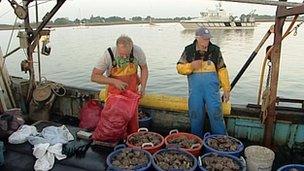Solent oyster fishing banned due to 'population collapse'
- Published

Fishermen have noticed oyster numbers plummet in recent years
Oyster fishing in the Solent is to be banned over fears of plummeting numbers.
The ban, which will come into effect on 1 November, has been introduced after the annual harvest dropped from 200 to 20 tonnes in the last five years.
The Inshore Fisheries and Conservation Authority (IFCA) said oysters were "failing to reproduce".
Fishing of the beds between Hampshire and the Isle of Wight will be banned for the whole of the four month season.
Harvesting will only be allowed in a small section of Langstone Harbour for four weeks.
Fisherman Gary Edwards said he had seen a "definite collapse" of the oyster population.
"Some of it is down to the boats being more efficient but there is definitely something else or some pollution that we're unaware of.
"We've lost the golden eggs of the fishery," he said.
'Sudden loss'
The IFCA's Rob Clark said the molluscs were "failing to reproduce [and] water quality and other invasive species have played their part, as has over fishing".
"We need to do something and we have to have some ambition how we can come together and restock this important fishery."
Plans include breeding oyster larvae and returning them to the beds, as well as examining the experiences of similar environments around the world.
Dr Simon Boxhall, lecturer in Ocean and Earth Science at the University of Southampton, said the beds as a "unique habitat".
"These used to be the largest self-sustaining natural fishery for native oysters in Europe.
"In terms of sewage, the water quality in the Solent has improved dramatically over the past 20 years, so it's very tricky to see what's causing this sudden loss.
"There is a lot of work to be done in trying to work out what the problem is."